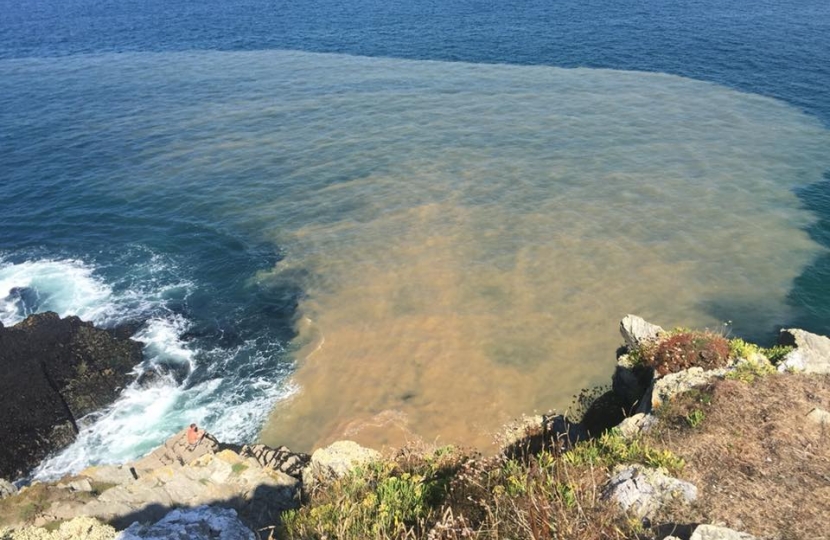
Storm Overflow sewage pollution is a serious issue that deserves serious action and I continue to be appalled by the ongoing dumping of raw sewage into the seas around Kent by Southern Water.
There has been a lot of misinformation published about this important issue - as explained here https://capx.co/beware-of-the-sewage-emanating-from-fake-news-websites/. It is fair to say that the government is actually meeting the task head-on, contrary to the messaging of certain campaign groups.
By way of some narrative on the situation, Storm overflows were designed as an emergency outlet for use in times of extreme weather conditions. But the age of our sewerage systems means that the complete elimination of discharges from storm overflows would be immensely costly. Initial assessments are between £150 billion and £600 billion and as the process would involve the complete separation of sewerage systems, this would potentially lead to significant disruption for homes, businesses and infrastructure across the country.
A task of this size would mean increased costs to customers and trade-offs against other water industry priorities would be unavoidable. A thorough understanding of what such trade-offs might be is therefore essential.
The Environment Bill now includes strong measures to deal with this issue, and others, as follows;
- a requirement for government to produce a report, setting out the actions that would be needed to eliminate discharges from storm overflows in England, and the costs and benefits of those actions.
- a new duty on Government to produce a statutory plan to reduce discharges from storm overflows, and their adverse impact. Reports on both of these measures are required to be laid before Parliament before 1 September 2022.
- a new duty directly on water companies and the Environment Agency to publish data on storm overflow operation on an annual basis.
- a new duty directly on water companies to publish near real time information on the operation of storm overflows.
- a new duty directly on water companies to monitor the water quality upstream and downstream of storm overflows and sewage disposal works.
- a new duty directly on water companies to produce comprehensive statutory Drainage and Sewerage Management Plans, setting out how they will manage and develop their drainage and sewerage system over a minimum 25-year planning horizon, including how storm overflows will be addressed through these plans.
- a power of direction for the government to direct water companies in relation to the actions in these Drainage and Sewerage Management Plans.
Additional action being taken outside the Bill, which will work hand-in-hand with the legislation, includes;
- Between 2020 and 2025, water companies will invest £7.1bn on environmental improvements in England. Of this, £3.1 billion will be invested in in storm overflow improvements specifically.
- In the Government’s draft Strategic Policy Statement to Ofwat, for the first time,they will tell the industry’s economic regulator that they expect water companies to take steps to “significantly reduce... storm overflows”, and that they expect funding to be approved for them to do so.
- In August 2020 we established the Storm Overflows Task Force to bring together key stakeholders from the water industry, environmental NGOs, regulators, and Government in order to drive progress in reducing sewage discharges. The Task-force has agreed a long-term goal to eliminate harm from storm overflows.
- The Government has also committed to reviewing the case for implementing Schedule 3 to the Flood and Water Management Act 2010 in England. This would set mandatory build standards for sustainable drainage schemes on new developments and has the potential to markedly reduce quantities of water unnecessarily entering the sewerage system.
Finally, it is worth understanding that the ‘storm overflows’ issue is only one part of the picture when it comes to improving water quality.
Other elements include reducing pollution from agriculture, wastewater, and abandoned metal mines, and reducing water demand. Action already being taken includes:
- Government funding for the Catchment Sensitive Farming programme has almost doubled with an additional £17m over the next three years. The new annual budget will be £30m, up from £16.6m in 2020 / 21. This includes allocating £1.2 million to the Environment Agency to significantly increase the number of inspectors visiting farmers to reduce diffuse water pollution, with 50 additional full-time employees recruited for inspections. Taking a catchment wide approach to water management is vital for a more holistic approach to water management.
- Over 3,000 hectares of new woodlands are set to be planted along England’s rivers and watercourses. Planting trees on and around riverbanks, or allowing them to grow naturally, can help to improve water quality by reducing the runoff of pollutants into rivers.
- The Environment Bill reforms elements of abstraction licensing to ensure our rivers can better support precious marine life. The Bill enables the environmental regulator to propose the variation or revocation of abstraction licenses, without liability for compensation.
- The Environment Bill creates a power to update the lists of substances and their respective standards which are potentially harmful to surface waters and groundwater. This will ensure regulations on water quality are keeping pace with scientific and technical knowledge.
- A Chalk Stream Restoration Group has been established which has just launched its restoration strategy for these precious habitats. The government is currently considering the recommendations.
I hope the magnitude of their action on the issue indicates the importance placed on water quality by the Government.
ENDS

